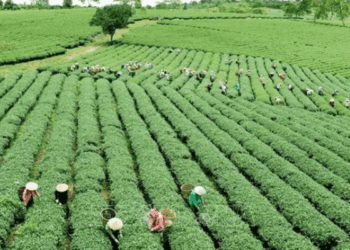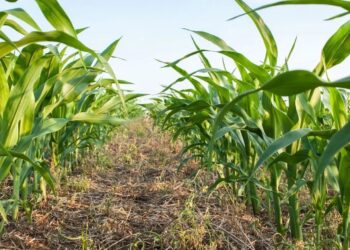With Nigeria’s agricultural sector at the crossroads of immense opportunities and persistent challenges, policymakers, stakeholders, and development partners have gathered again last week in Abuja to validate the 2022–2024 Agricultural Joint Sector Review (JSR) reports and unveil the 3rd National Agri-Food Systems Investment Plan (NASIP) for 2025–2027.
The high-level workshop held in Abuja brought to the fore Nigeria’s renewed push to align national agricultural strategies with the Comprehensive Africa Agriculture Development Programme (CAADP), the continental framework designed to accelerate growth and food systems transformation across Africa.
Delivering the opening remarks, the Permanent Secretary of the Federal Ministry of Agriculture and Food Security, Dr. Marcus Olaniyi Ogunbiyi, stressed the workshop’s importance in measuring Nigeria’s performance against CAADP benchmarks.
“CAADP remains a transformative initiative aimed at revitalizing agriculture across our continent, It serves as a roadmap for achieving food security, reducing poverty, and stimulating economic growth, with commitments to a 6 per cent growth rate in agriculture and at least 10 per cent budgetary allocation to the sector, ” Ogunbiyi said.
The programme, adopted in 2003 by African Union Heads of State and Government, has gone through various phases, from the Maputo Declaration (2003–2014) to the Malabo Declaration (2015–2025) and now the Kampala Declaration (2026–2035). The latter, endorsed earlier this year in Uganda, sets an ambitious agenda for a resilient and transformative agri-food system across the continent.
Nigeria has shown notable progress in CAADP reviews. In the 2017 and 2023 Biennial Review Reports, the country ranked 4th and 3rd respectively, demonstrating momentum despite still being “off-track” on certain targets.
“Though Nigeria is not yet fully on track, our progress reflects a strong commitment to sustainable growth in the agricultural sector,” Ogunbiyi explained.
To deepen this commitment, the federal government inaugurated an Agricultural Sector Working Group in April 2025, bringing together state and non-state actors to domesticate the outcomes of the Kampala Declaration. In addition, a 10-year Strategic Action Plan (2026–2035) is being developed to guide Nigeria’s post-Malabo agricultural era.
Nigeria’s agricultural landscape is already witnessing landmark reforms and projects Special Agro-Processing Zones have been launched in Kaduna, Cross River, and Oyo States, designed to strengthen value chains, reduce post-harvest losses, and improve rural livelihoods.
The Renewed Hope Mechanisation Programme, unveiled by President Bola Ahmed Tinubu in June, introduced 2,000 tractors that will cultivate over 550,000 hectares, yielding over 2 million metric tons of staples while creating jobs for youth and women.
The National Agricultural Land Development Agency (NALDA) is being repositioned to expand land availability for production.
A N1.5 trillion recapitalisation of the Bank of Agriculture (BoA) is underway to unlock finance for farmers.
The National Agricultural Development Fund (NADF) has been established to support production, research, and training in line with CAADP priorities.
“These interventions are not just about increasing output,” Ogunbiyi stressed, “but about building resilience, inclusivity, and competitiveness in our food system.”
A core feature of the Abuja workshop was the validation of Joint Sector Review (JSR) reports, the monitoring tool that measures how well Nigeria is performing against CAADP commitments.
“The JSR process ensures transparency and accountability, it provides evidence on where progress is being made and where gaps still exist, particularly in investment financing, farmer support, and food systems sustainability,” Ogunbiyi noted.
The NASIP (2025–2027), under review, is expected to serve as a guide for identifying investment opportunities, bridging financial gaps, and crowding in private sector and donor interventions.
In his welcome address, Mr. Ibrahim Tanimu, Director of Planning and Policy Coordination, emphasised the collaborative spirit behind the exercise.
“Agriculture remains the backbone of our economy,” Tanimu said.
“This workshop provides us with a unique opportunity to reflect on achievements, confront constraints, and strategise together. The diverse perspectives of government, farmer groups, financial institutions, and development partners are vital in shaping policies that can truly transform livelihoods,” he added.
He called on participants to engage actively in dialogue, share best practices, and champion innovation to strengthen Nigeria’s agricultural frameworks.
Analysts said Nigeria’s alignment with CAADP is not just about ticking continental boxes, but about ensuring food security, job creation, and poverty reduction in a country where agriculture provides livelihoods for over 70 per cent of the population.
The validation of NASIP therefore signals more than a technical review to reflecting Nigeria’s determination to rally stakeholders towards a shared agenda that can unlock billions in agricultural investments.
As Ogunbiyi pointed out, “We must embrace CAADP as a blueprint for action, one that empowers our farmers, enhances food security, and drives economic growth. Together, we can transform agriculture into a true pillar of resilience and prosperity.”
With the Kampala Declaration setting the next phase of Africa’s agricultural transformation, Nigeria’s 3rd National Agri-Food Systems Investment Plan could be the cornerstone for a decade of renewal in its food system, if matched with sustained political will, funding and accountability.





